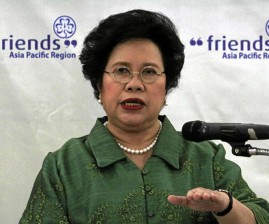Santiago defends DOJ’s bid to have 3 senators’ passports cancelled
MANILA, Philippines — Senator Miriam Defensor-Santiago defended the Department of Justice’s (DOJ) request to cancel the passports of three senators and other individuals involved in the P10 billion “pork barrel” scam, saying it was an “act of pre-emptive self-defense” under international law.
“You don’t wait for a shot to be fired before you press the trigger,” Santiago, chairman of the Senate committee on foreign relations, said in a statement on Friday.
The DOJ requested the Department of Foreign Affairs Wednesday to cancel the passports of Senate Minority Leader Juan Ponce-Enrile, and Senators Jose “Jinggoy” Estrada and Ramon “Bong” Revilla Jr. and 35 others charged with plunder at the Office of the Ombudsman in connection with the “pork” scam.
Under the 2005 UN Convention Against Corruption (UNCAC) and the 1980 Vienna Convention on Law of Treaties, Santiago said, the Philippines is obliged to cancel the passport of the senators and other individuals in the scam.
“Let us assume for the sake of argument that there is a conflict between, on the one hand, a treaty to which the Philippines is a party; and on the other hand, a Philippine law. The conflict is resolved by the Philippine Constitution, which provides that the Philippines adopts the generally accepted principles of international law as part of the law of the land,” she said.
Article continues after this advertisementThe senator said “part of the law of the land” means that a treaty to which the Philippines is a party should be applied as if it were a law passed by Congress.
Article continues after this advertisement“Therefore, if there is a conflict between applicable international law and Philippine law, that which is later in time shall prevail. The new law supersedes the old law,” she pointed out.
Santiago then cited the 1989 case of Abbas v. Comelec, where the Supreme Court ruled that Philippine jurisprudence deems treaties to be of the same class as statutes.
“Since the Passport Act was promulgated in 1996, and the UNCAC came into force in 2005, then the UNCAC, being later in time, prevails over the Passport Act,” she said.
The Passport Act provides that a passport may be cancelled only on three grounds: the holder is a fugitive from justice; the holder has been convicted of a criminal offense; or the passport was acquired fraudulently or tampered with.
But under treaty law, Santiago said, the Philippines is committed to implement the UNCAC in good faith, particularly the treaty provision identifying corruption as a threat to national security.
She said the said provision provides that party-states are obliged to maximize the effectiveness of law enforcement measures relating to corruption, as provided by the UNCAC, Art. 30, para. 3.
Santiago also pointed out that the UNCAC preamble was premised on the need to stop corruption, particularly cases “that involve vast quantities of assets, which may constitute a substantial proportion of the resources of States, and that threaten the political stability and sustainable development of those States.”
“The plunder cases undergoing preliminary investigation involve vast quantities of assets, including P10 billion” she said.
Santiago noted that just days before the cases were filed in the Ombudsman, Enrile’s former chief of staff, Jessica “Gigi” Reyes and Ruby Tuazon, another respondent in the case, reportedly left the country last August.
Tuazon was identified with Estrada’s father, former President and now Manila Mayor Joseph Estrada.
“Under the Rules of Court, the flight of persons in interest points to a number of implications. One implication is that since the Ombudsman’s preliminary investigation will soon be terminated and – in view of the alleged truckloads of evidence already reported by the media – will likely be charged in court, the possibility of flight is extremely high,” Santiago said.
“In the interest of national security, the state is not immobilized by its own domestic law to allow persons in interest to morph into fugitives from justice before taking what could be a futile action,” she further said.
Related Story:
